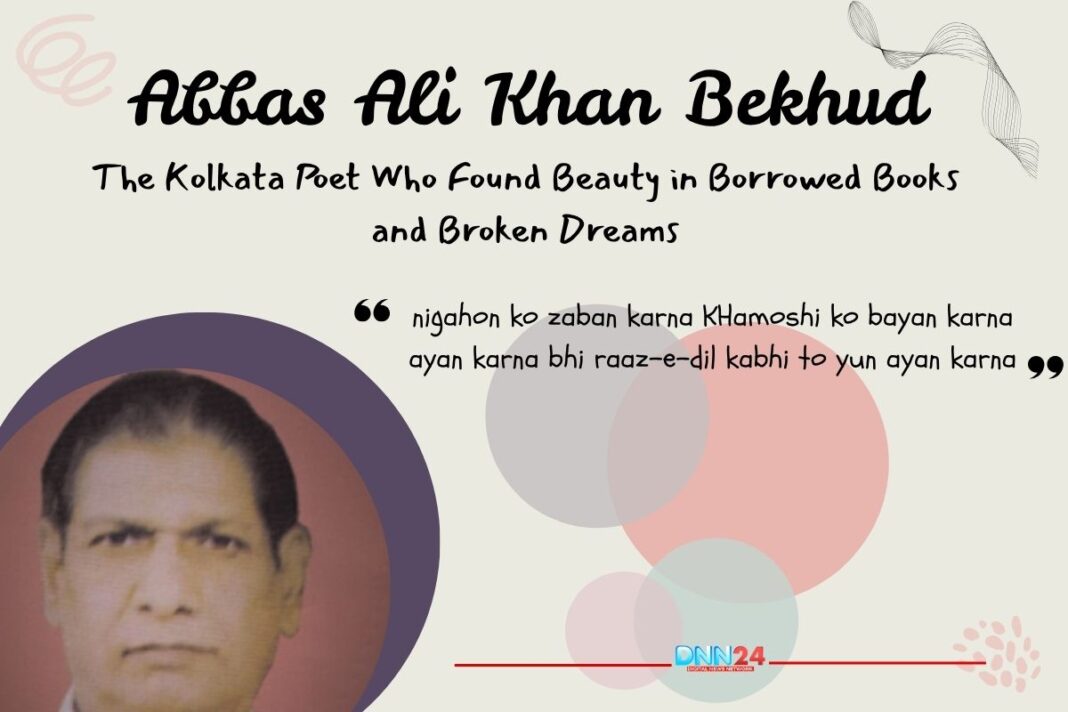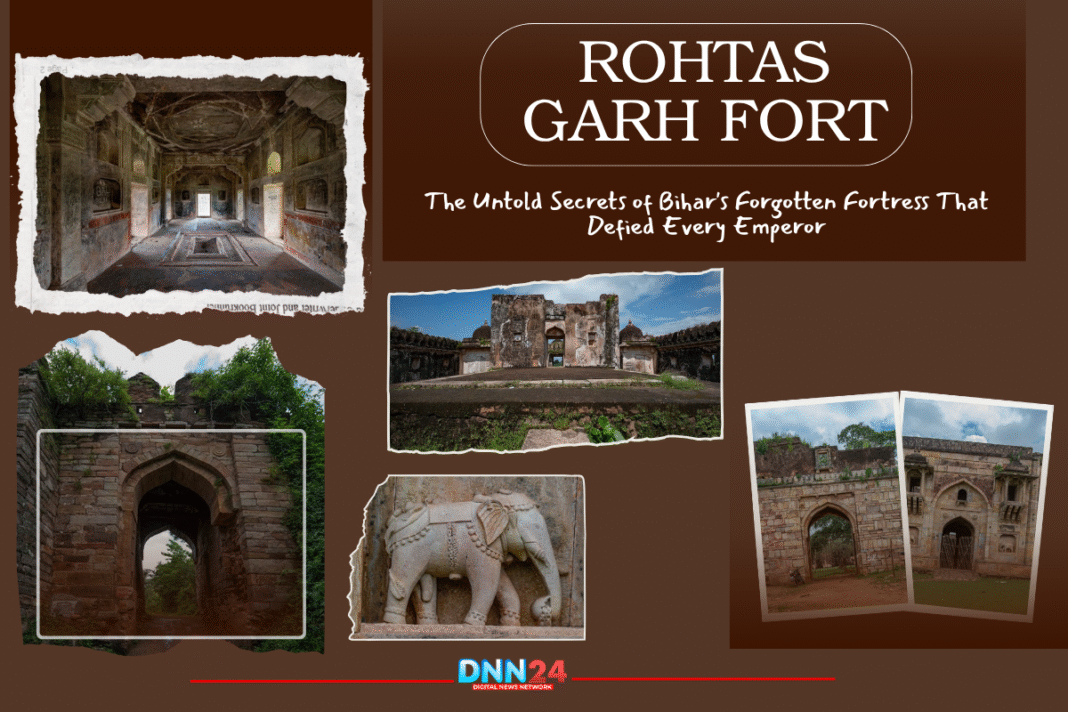What happens when a boy reads poetry under streetlamps because his home has no electricity? Abbas Ali Khan Bekhud answered that question with a lifetime of verse that transformed ordinary suffering into extraordinary art. His story begins not in literary salons but in the crowded alleys of early twentieth-century Kolkata, where dreams were as common as dust and twice as easily lost.
kisi se ishq karna aur is ko ba-KHabar karna
Abbas Ali Khan Bekhud
hai apne matlab-e-dushwar ko dushwar-tar karna
Early Days: Kolkata’s Forgotten Son
Born as Ali Abbas Khan in Kolkata on July 2, 1906, Bekhud grew up breathing the city’s unique air, a mixture of rickshaw bells, tea stall conversations, and Urdu literary gatherings where brilliant minds discussed poetry between sips of chai. His father collected secondhand books whenever money allowed. His mother hoarded Urdu magazines like treasures, saving them from whatever little remained after household expenses. The family lived, often struggling to make ends meet.
mohabbat ghair-fani hai maraz hai la-dawa mera
Abbas Ali Khan Bekhud
KHuda ki zat baqi hai mohabbat hai KHuda mera
One story, passed down by his first student, captures those early years perfectly. Young Bekhud wrote a poem about monsoon rains flooding their narrow alley. He gathered the courage to recite it at a local mushaira, where poets shared their work before audiences. The evening went well, but walking home through the downpour, his precious page got completely soaked. Later, he called this incident his “first lesson in losing and longing.” Education came hard for Abbas.
shikayat bewafai ki na kar duniya-e-fani mein
Abbas Ali Khan Bekhud
wafa ka nam baqi hai faqat qisse kahani mein
Many school days were missed because survival demanded attention elsewhere. He often studied under street lamps, copying lessons in dim light while other children slept in comfortable homes. Yet these hardships shaped him. The awkwardness of poverty, the sting of exclusion, the weight of unfulfilled desires, all became material for his poetry. Kolkata’s chaos taught him empathy. Its streets schooled him in human nature.
ghair ke sath kabhi zikr hamara na karen
Abbas Ali Khan Bekhud
hum ko bad-nam karen ishq ko ruswa na karen
Late at night, he listened to Urdu broadcasts on the radio, scribbling couplets that transformed bitterness into something beautiful. Pain became his teacher, resilience his subject. This foundation, built not in comfort but in struggle, gave birth to a poetic voice that would speak for countless others who lived on society’s margins.
Mentors, Madness, and the Making of a Poet
Every artist needs guidance, and Bekhud found his in Wahshat Raza Ali Kalkatvi, a poet whose understanding of human pain matched his own. Their first encounter has become legend. Wahshat attended a poetry symposium where young Bekhud recited a ghazal. The older poet sat stunned, later describing the experience as “hearing a rain-thirsty garden bloom overnight.” That moment changed everything. But recognition did not mean easy success. Bekhud taught Urdu in colleges to earn his bread, composing verses alone in modest hostel rooms after long teaching hours.
ham-nashinon mein hamara ham-nawa koi nahin
Abbas Ali Khan Bekhud
aashna to hain bahut dard-ashna koi nahin
The journey proved rough. He sent his poems to established magazines repeatedly, collecting rejections like others collected praise. Then came the day he adopted his pen name “Bekhud,” meaning “the lost one.” The name fit. His poetry explored loss in all its forms, innocence surrendered to cynicism, dreams crushed by daily routine, and love destroyed by separation. One particular story stands out. After a family crisis forced him to pawn his favourite pen, Bekhud wandered Kolkata’s streets through an entire night. Dawn found him returning home to write a nazm about hope rising with the sun.
hijr ki shab zulf-e-barham ka KHayal aata raha
Abbas Ali Khan Bekhud
ek na ek har din mere sar par wabaal aata raha
These dark episodes never turned him bitter. Instead, they added luminous fragments to his ghazals, creating verses that glowed with both sorrow and tenderness. His mentors recognised this quality, teaching him that wounds provide the ink for genuine poetry. They nurtured not just his technical skills but his emotional honesty. Between moments of madness and stillness, between struggle and small victories, Bekhud quietly became the voice that Kolkata’s Urdu community needed, even before anyone fully realised his worth.
be-wajh nahin un ka be-KHud ko bulana hai
Abbas Ali Khan Bekhud
aaina-e-hairat se mahfil ko sajaana hai
Evolving Verse: From Personal Strife to Universal Connection
As years passed, Bekhud’s reputation expanded beyond local circles. He earned degrees in Urdu and Persian from Calcutta University, transforming himself from a struggling survivor into a skilled artisan of language. His position at Islamia College allowed him to influence young minds, teaching them that poetry could carry both empathy and truth. Students remembered him as someone who found meaning in everyday sorrows and brief moments of happiness. His anthology, Jaam-e-Bekhudi, collected the bittersweet essence of his experiences into one remarkable volume.
maza aata kisi surat agar tark-e-wafa hota
Abbas Ali Khan Bekhud
tumhaari tarah main bhi be-wafa hota to kya hota
Former students shared stories about his dedication. Despite recurring health problems, Bekhud wrote daily without fail. He often returned late from lectures, yet still found energy to compose couplets about Kolkata’s evening light or the ache of lost friendships. His famous lines, “Tawajjoh chaara-gar ki bais-e-taklif hai ‘Bekhud’ / Izafa hai museebat mein dawaon ka asar karna”, revealed his gift for finding irony and insight in life’s contradictions. Through his verses, readers discovered their private miseries transformed into words that healed and celebrated ordinary human experience.
ai kash na hota ye asar aah-e-rasa mein
Abbas Ali Khan Bekhud
ek barhami aati hai nazar zulf-e-dota mein
Personal tragedies marked his path. His mother’s early death left lasting scars. A near-fatal illness reminded him of mortality’s presence. Yet Bekhud responded not with withdrawal but with a deeper connection, reaching out through poetry to both common readers and sophisticated critics. These struggles refined his art, making him a poet who offered more than beautiful words. He extended a hand to fellow travellers navigating life’s difficult roads, proving that poetry could be both art and companionship.
ghairon ke sath baiThe hain is anjuman mein hum
Abbas Ali Khan Bekhud
kanTon se wasta hai magar hain chaman mein hum
Lasting Legacy: Inspiration In Every Struggle
Abbas Ali Khan Bekhud died in Kolkata in 1969, but his influence refuses to fade. He distilled lived reality’s pain and beauty into verses that continue pulsing with gentle power. His students, including notable poets like Munawwar Rana and Qaisar Shameem, carried forward his quiet revolution in Urdu literature, a blend respecting classical tradition while embracing new emotional honesty.
kisi se ishq karna aur us ko ba-KHabar karna
Abbas Ali Khan Bekhud
hai apne matlab-e-dushwar ko dushwar tar karna
Today, his couplets echo at mushairas, whispered by lovers, recited by teachers, remembered by street-side dreamers. The untold stories of his life prove that creative brilliance needs no grand stage. It grows quietly in adversity, nurtured by silent acts of courage and kindness. Bekhud’s journey, built on unseen sacrifices and stubborn hope, teaches contemporary poets that obstacles hide new metaphors, heartbreaks conceal hidden melodies.
taDapta hai teri furqat mein koi nim jaan ho kar
Abbas Ali Khan Bekhud
sitam hai pher lena aankh tera mehrban ho kar
His ghazals are not museum pieces but living echoes of courage, a literary hand resting on the shoulder of anyone fighting private battles. Reading Bekhud today means remembering that inspiration is not some distant star. It is the quiet fire glowing in every trial overcome, every sorrow accepted, every verse written despite doubt and loss.
naza ki saKHti baDhi un ko pasheman dekh kar
Abbas Ali Khan Bekhud
maut mushkil ho gai jine ka saman dekh kar
For those who struggle with language and life, Bekhud remains a steadfast friend, urging everyone to discover poetry in their lived reality’s rough edges. His voice continues speaking across decades, reminding us that beauty often grows best in borrowed soil, under streetlamp light, in hearts that refuse to stop dreaming.
Also Read: Saqi Farooqi: The Rebel Poet Who Kept Urdu Alive in London
You can connect with DNN24 on Facebook, Twitter, and Instagram and subscribe to our YouTube channel.



